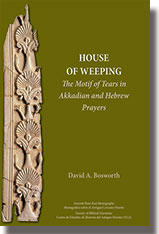
$29.95
Explore the meaning and effects of weeping in ancient texts
David A. Bosworth draws on scientific research on weeping to understand references to a petitioner’s tears in biblical and other ancient Near Eastern prayers. Drawing from Hebrew and Akkadian texts, Bosworth illustrates how weeping reflects helplessness and being overwhelmed with emotion as well as how tears often motivate others to help. Because people turn to prayer at times of extreme distress, weeping and prayer may reinforce one another as strategies to move the deity to offer assistance. For example, when prayers that mention weeping assume that the deity is angry, tears function as part of calming divine wrath. Bosworth’s substantive engagement with the sciences demonstrates how scientific scholarship can enhance humanities research and vice versa.
- A theory of prayer drawn from scientific studies of emotion regulation
- Corpus-based research that permits analysis of the distribution of the weeping motif in diverse genres
- Substantive comparisons between biblical and Mesopotamian prayers without treating either as secondary or collapsing their differences
David A. Bosworth is Associate Professor of Old Testament at The Catholic University of America. His book Infant Weeping in Akkadian, Hebrew, and Greek Literature (2016) along with articles on Jeremiah, Lamentations, and prayer form part of a research project investigating the function of weeping in ancient texts.
Download volume front matter, including table of contents and introduction.
Download a printable publication sheet that you can put in your files or give to your librarian or bookstore.
This is Ancient Near East Monographs 24Download a printable standing order sheet to see other available volumes in the series and to give to your librarian to set up a standing order.
